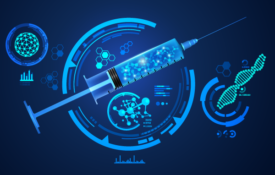-
2020 Led to Soul-Searching, Sparking Meaningful New Resolutions
The challenges of 2020, one of the most surreal years in recent memory, prompted some individuals to make ambitious resolutions. “It is leading some people to think it’s time to say, ‘I see that life can be fragile, I need to re-prioritize what’s important to me.’ ” said John C. Norcross, a professor and chair of the psychology department at Pennsylvania’s University of Scranton. While some people found themselves too overburdened by the demands of 2020 to bother making resolutions, “others are recalibrating in their own way, whether it’s less screen time and family-game night or saying, ‘I appreciate the need to slow down,’ ” Dr.
-
Being Heard is More Important To Some People Than Following Covid-19 Regulations, Psychologist and Activists Say
Fighting institutions of power is as American as it gets. Throughout the history of this country, many have taken action in the form of demonstration to fight real and/or perceived injustice. However, until 2020, no demonstrator ever had to take to the streets with Covid-19 threatening them. Covid-19 has changed everything -- and despite stay-at-home orders, calls for social distancing and mask-wearing, somepeople have shown time and again over the last year that they just want to be heard. Gathering in large groups, sometimes mask-free, isn't as big of a deal to some Americans if it means they will be able to vocalize their beliefs.
-
Five Things Worth Knowing About Empathy
A tortoise lies on its back, legs waving in distress, until a second tortoise crawls up to turn it over. Millions have watched this scene on YouTube, with many leaving heartfelt comments. “Great sense of solidarity,” says one. “There is hope,” says another. The viewers are responding to what many interpret as empathy — a sign that even in the animal world, life isn’t just dog-eat-dog. Alas, they’re probably wrong. As one reptile expert observed, the second tortoise’s motives were likelier more sexual than sympathetic.
-

How Depression and Stress Could Dampen Efficacy of COVID-19 Vaccines
Health behaviors and emotional stressors can alter the body’s ability to develop an immune response to vaccines, including—potentially—the new COVID-19 vaccines.
-
The Best Evidence for How to Overcome COVID Vaccine Fears
Operation Warp Speed has certainly lived up to its name. The arrival of the first coronavirus vaccines less than a year after the pandemic began blew away the previous development record of four years, which was held by the mumps vaccine. Now social scientists and public health communications pros must clear another hurdle: ensuring that enough people actually roll up their sleeves and give the shots a shot—two doses per person for the Pfizer-BioNTech and Moderna vaccines that won emergency use authorization from the U.S. Food and Drug Administration in mid-December.
-

Depression and Stress Could Dampen Efficacy of COVID-19 Vaccines: Interventions and Health Behavior Changes Could Boost Immunity
Health behaviors and emotional stressors can alter the body’s ability to develop an immune response to vaccines, including—potentially—the new COVID-19 vaccines.

